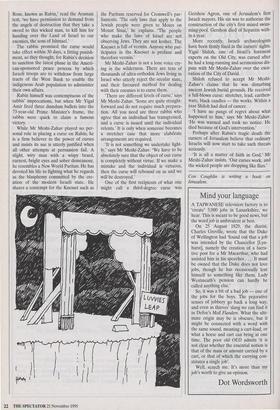Mind your language
A TAIWANESE television factory is to `create' 3,000 jobs in Lanarkshire, we hear. This is meant to be good news, but the word job is ambivalent at best.
On 25 August 1829, the diarist, Charles Greville, wrote that the Duke of Wellington had 'found out that a job was intended by the Chancellor [Lyn- hurst], namely the creation of a lucra- tive post for a Mr Macarthur, who had assisted him in his speeches . . It must be owned that the Duke does not love jobs, though he has occasionally lent himself to something like them. Lady Westmeath's pension can hardly be called anything else.'
So, it was a bit of a bad job — one of the jobs for the boys. The pejorative senses of jobbery go back a long way, and even as thieves' slang we can find it in Defoe's Moll Flanders. What the ulti- mate origin may be is obscure, but it might be connected with a word with the same sound, meaning a cart-load, or what a horse and cart can bring at one time. The poor old OED admits 'it is not clear whether the essential notion is that of the mass or amount carried by a cart, or that of which the carrying con- stitutes a single job'.
Well, search me. It's more than my job's worth to give an opinion.
Dot Wordsworth


















































































 Previous page
Previous page